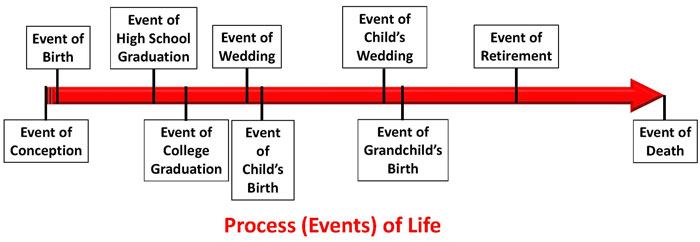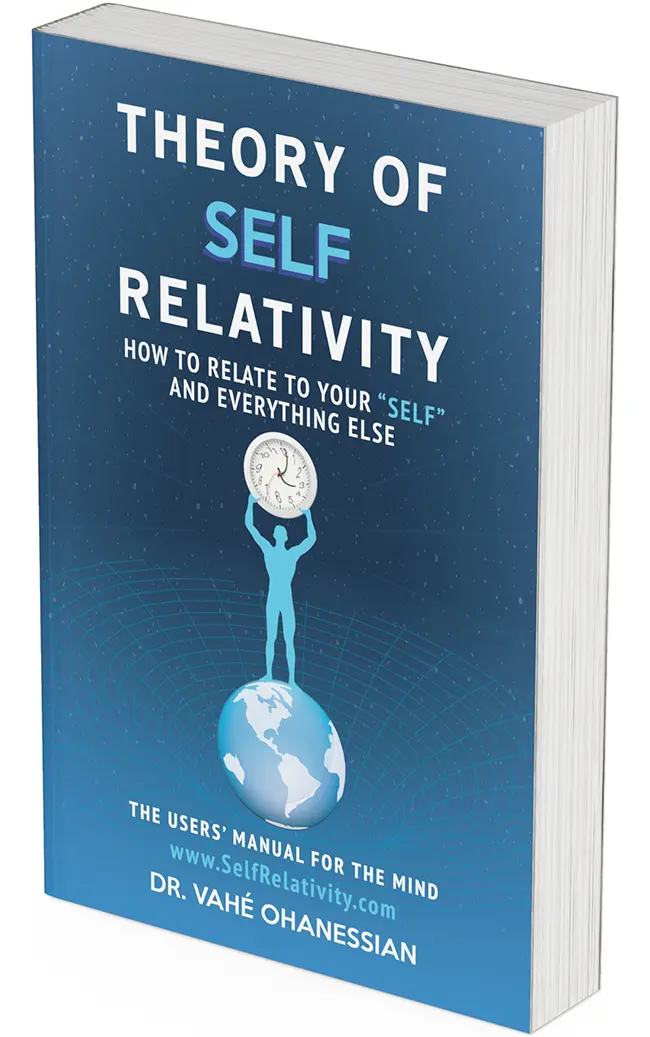Event vs Process
Self-improvement can only be achieved by making a change.
Change is not an “event”; it is an ongoing “process.”
"Change and improvement are not singular events; they are continuum of events in the process of life."
One of the main reasons why self-improvement and personal-transformation have been a challenge is because most people seek for quick-fixes and instantaneous gratification rather than longer-term and stable results. As described throughout the Theory of Self-Relativity, our immediate need and quest to feel good or at the minimum to feel less-bad is so strong that we will do anything including lying to and fooling our own Self to quickly minimize negativities and to increase positivity. Since facing facts is often an emotionally difficult task because facts that require change are often dislikable and uncomfortable to deal with; the amount of time that we waste in trying to reach quick feel-good results collectively adds up to a much larger amount of time wasted without achieving any improvement. One of the main difficulties in trying to achieve a stable and constant improvement is to learn to commit to an ongoing improvement process with a definitive final result rather than trying to achieve a big-bang result from a temporary feel-good event. Although rare, unique, and grand things are hallmarked with an event; things do not take shape as a result of an event.
"An event is a distinct moment which occurs as a result of an ongoing process."
Even the formation of The-Universe that we currently live in which occurred as a result of the Big-Bang, didn’t take shape at the time of the Big-Bang. The-Universe has gone through a 13.8-Billion-year process to be the way it is currently and it will continue evolving through this process as it transforms into the future. Similarly, our life began with the event of conception however for us to become the cognizant living beings that we are; the event of our conception had to go through the process of our birth, childhood, adulthood and as it will, our eventual death. Even the moment of our conception was an identifiable event that required other processes to get the egg and the sperm to meet and conceive. We are who we are not because of an event but because of a process and we keep changing and evolving as the process continues. Therefore, an event is simply an identifiable moment or timestamp that cannot occur on its own without an underlying and ongoing process.
"Theory of Self-Relativity defines an “event” as “a defined moment in the continuum of a process.”
Although the events that stand out in our lifetime are memorable or identifiable as moments in time; they all resulted and will continue to result because of an ongoing process. For example, our high school graduation was an event that was in the making for over a decade which started when we first entered kindergarten. Hence although we can identify many good and bad events in our life, our life is not simply a collection of events but a continuation of a process.

Human beings have an easier time reflecting on a certain moment in history as a representation of memory or change because timestamping a moment in the past makes it easier to remember that moment than to be able to remember the intricate details that it took to get to that moment. We timestamp cyclical recurrences such as birthdays as events just as we timestamp non-cyclical occurrences such as graduations, weddings, funerals, and other memorable positive and negative moments as events in time. We remember the events with our feelings and based on how they made us feel at that moment; however, what we fail to recognize is that events are easily identifiable moments in time that occurred as a result of a lengthier underlying process. Unless an event somehow occurred as a result of a miracle or a supernatural cause which science has proven to be impossible; events are simply timestamped moments in the continuum of an ongoing process.
Events don’t just happen; they require a process to lead to the event and events that directly affect our lives not only require a process but also require taking action to initiate the process. Even an event as rare as winning the lottery requires the effort and the process of buying tickets; often for weeks, months, and even for years. Without going through the process of buying a ticket a person won’t be able to experience the event of winning the lottery. Although the probability of us winning the lottery is very small when millions of people simultaneously buy tickets, the probability of someone winning the lottery increases. On an individual basis that probability for each person is as small as it is for everyone else, however, the collective probability of someone winning the lottery increases as the number of players increases; the more tickets are bought, the higher the chance is for someone to win. Therefore, the occurrence of such a truly unlikely event should not be categorized as luck or miracle but it should be considered as a low probability event. The same holds true with other personal-events such as birth, weddings, selling a company for a big profit, and so on; they are all events in the timeline of an ongoing process, and that personal-process is our individual lifetime.
Every event is a result of a previous event in the continuum of the process and to experience favorable events we must learn to guide the process ourselves so that the continuum of the process will get us to that event faster and further. Since events are a result of a previously initiated event and as a continuum of the process and since every event is a timestamp in the continuum of a process; therefore, an event when properly built upon will get us to the next event in the continuum of the process. As long as we do not accept an event as finality, every event is an “opportunity” to build upon to reach a stronger and more favorable next event. Opportunities which lead to change or success are created as a result of the continuation of events regardless of the nature of the event.
"Opportunities are created by the opportunistic person."
Success is a process that results from many events of failures and prior successes. As long as we do not accept failure or success as a finality, all we have to do is learn from and use that failure or success to move along the process to the next successful event. However, when we accept especially failure as finality, that is how we get our minds stuck in the past and why we cannot move forward with time.
"Mistakes and failures are simply events in the timeline of progress and success."
There are no final-events in The-Universe however there is only one final-event in Our-Universe and that final-event is our death. Any other event in our lifetime should be viewed as an event that should be used to guide us to the next better event in the process of our lifetime.

